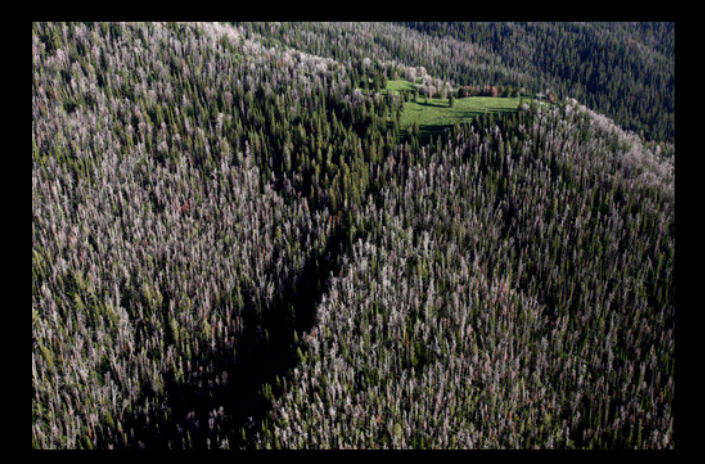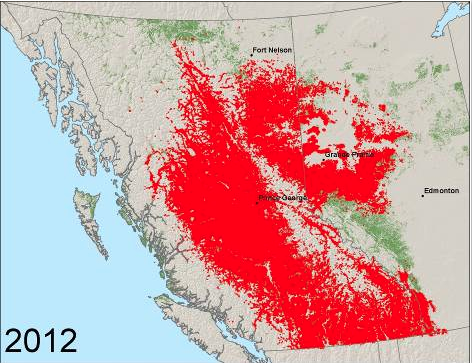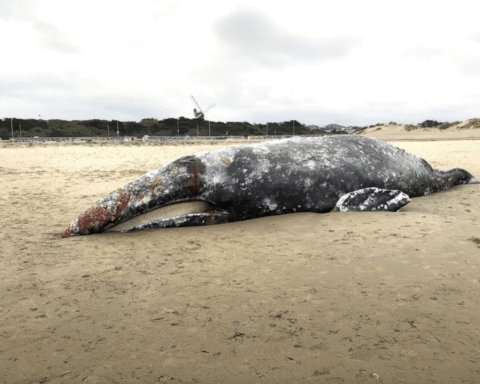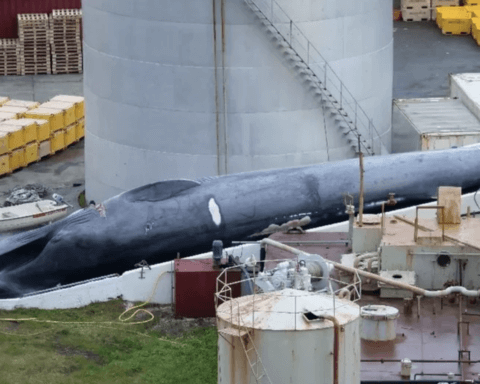Why has Earth’s climate changed so radically in such a short span of time? The elephant in the living room is combustion heat from fossil fuels and wood pellets chopped up from old-growth forests. That accumulated heat is being stored deep within the oceans. Over the previous 25 years, that heat is the equivalent of dropping 3.6 billion Hiroshima atom-bombs. The oceans drive Earth’s climate, which has become unstable with both higher highs and lower lows.
Even to the untrained eye, the effects of climate instability are highly conspicuous across western North America’s cold tolerant and hardy coniferous forests.

Image Credit: Rick Egan
Since 1970, temperatures across the West have jumped up between 4 and 6F (2.2-3.3C). Further north into the vastness of British Columbia, Canada, the winter temperature has also spiked by 5.6F (3.1C). In biology that’s a big deal.
As temperatures have risen, all hell has broken loose within the forests. Essentially, unscrupulous bankers, insatiable fossil fuel oligarchs and their corporations, and rapacious timber barons have irrevocably stolen nature’s cold ecological blanket, which is a natural population check against bark beetle epidemics.

Image Credit: Thomas McDowell
Burning fossil fuels and wooden pellets have unleashed nature’s harbinger of heat, trillions of indigenous bark beetles. These opportunistic insects have sped up their life cycles and modified their body size. They are synchronized to regional
epidemics, conquering new habitat and even new tree species (e.g., Jack pine). Lastly, they have found a new fungus to carry in their jaws along the eastern side of the Northern Rockies and begun their march to the Atlantic Ocean.
As temperatures have risen, all hell has broken loose within the forests.
The results on a sub-continental scale are utterly astonishing. Canada, the second largest forested country on the planet, has seen its forests break down. They are emitting more carbon dioxide rather than storing it. “Houston, we have a problem.”

Image Credit: Canadian Forest Service
Across the continent, in excess of 35 billion mature coastal, montane and subalpine mature pines and spruce are dead (beetle-killed) and decomposing. They are perfect powderkegs. Moreover, minus the mature forests, the winter snowpacks are declining. There are fewer springtime meltwaters coursing throughout the West. Those meltwaters, by the way, are vital for 70 million people and the most intensive agricultural system on Earth, California’s Central Valley.
Fossil fuel heat is drying out and heating up the old-growth forests at an unprecedented rate. We need all the remaining old-growth forests alive and functioning as supreme carbon warehouses, water and climatemakers, loaded with biodiversity and medicines, in order to survive.

Image Credit: sfgate.com
These higher temperatures and horrendous fossil fuel-driven droughts are stoking climate gigafires (firestorms in excess of a million acres). In fact, >8.2 million acres were charred across the West during the summer and autumn of 2020. August, September and October were a continuous nightmare from hell with the worst fire season ever recorded in California, Colorado, Oregon and Washington. The firestorms and putrid air were infernal. Many, many millions of animals and a billion insects were incinerated. Oh dear gawd!
The Gen Zs (under 26 year olds) demand a zero-combustion economy. We have solar and battery technologies, the labor force and the window of opportunity (2021-2030) to walk away from fossil fuel energy. The $47.7 trillion necessary to future-proof the planet could be diverted from the obscene fossil fuel gravy train, i.e., its $5.3 trillion annual subsidies.
This much we know: more water-poisoning fracking, liquefied natural gas (LNG), coal and combustion of wood pellets will result in horrible megadroughts, unrelenting longer-lasting heatwaves, deadly climate gigafires, insect apocalypse, monster hurricanes, typhoons and fatal storm surges, deluging rainfalls, accelerated melting of sea ice, icecaps including all land glaciers with the resultant ever-rising sea levels, deoxygenation and increased ocean acidity, regional crop failures, mass starvation and unimaginable climate instability, rendering our only home uninhabitable. Unfracking acceptable.

The Gen Zs demand and expect much better from the adults who conceived them. So the adults must respect that expectation by ensuring the Gen Zs have a habitable planet!
#Vote
#ConsumeLess
#GoVegan
#Coexist
#Respect
#TheGreatForestCase
#FridaysForTheFuture
#Strike4Climate
#GlobalHeating
#ClimateFires
#Resist
•••••••••••••••••••••••••••••••••••••••••••••
Dr Reese Halter is an award-winning broadcaster, distinguished conservation biologist and author.
Dr Reese Halter’s upcoming book is
GenZ Emergency
Tweet @RelentlessReese
•••••••••••••••••••••••••••••••••••••••••••••












